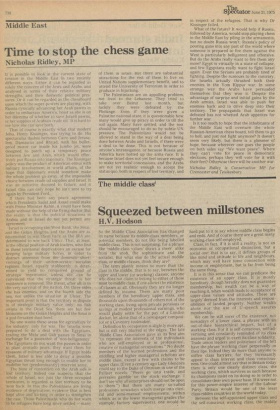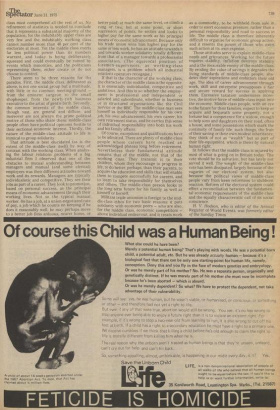The middle class'
Squeezed between millstones
H.V. Hodson
So the Middle Class Association has changed its name because its middle-class members, or potential members, do not like being labelled middle class. This is not surprising; for a phrase like 'middle-class values' draws a sheer alike from the snob, he sophisticate and the socialist. But vhat else do the actual middle class, or middle classes, think they are?
The term plainly means no more than the class in the middle, that is to say, between the upper and lower (or working) classes; anyone who does not claim to belong to either of those must be middle class, if one allows the existence of classes at all. Obviously they are no longer defined by income. There are many poor members of the hereditary upper class, and thousands upon thousands of others not of the working class, living upon private pensions or savings or modest professional earnings, who would gladly settle for the pay of a London docker, let alone that of a newspaper compositor or a Coventry toolmaker.
Definition by occupation is slightly more apt, but is still very blurred at the edges. The late Middle Class Association gave as its first aim "to represent the interests of the individuals who are self-employed Or in professional, creative or managerial occupations." No doubt members of the learned professions and the middling and higher managerial echelons are middle class, except a few with claims to be upper class. (Even a century ago Lady Glencora could say to the Duke of Omnium in one of the Palliser novels: "Peers go into trade, and peeresses gamble on the stock exchange. I don't see why all enterprises should not be open to them.") But there are many so-called professions nowadays which merge into clerical and semi-manual employments, within which, as in the lower managerial grades (for example, factory supervisors), one would be hard put to it to say where middle class begins and ends. And of course there are a great many working-class self-employed. Class, in fact, if it is still a reality, is not an economic or occupational distinction, but a social one: that is to say, it defines groups of like mind and attitude to life and neighbours, which may well have some connection with income or employment, but is far from being the same thing. It is in this sense that we can predicate the existence of an upper class. It is mostly hereditary, though heredity does not guarantee membership, but wealth can be a way of reaching it, when wealth leads to acceptance of upper-class values and attitudes. These are largely'clerived from the interests and responsibilities of landed property. Neither wealth alone nor the use of U-speech assures membership.
We can be still surer of the existence, not nowadays of a lower class, a phrase with an out-of-date hierarchical import, but of a working class. For it is self-conscious, self-advertising and constantly reminded of its class interests and urged to exert its class solidarity. Trade union leaders and politicians of the left have the phrase 'working class' perpetually on their lips. Indeed they do more than anyone to stiffen class barriers; for they incessantly appeal to class interest and class consciousness. One could almost say that in Britain today. there is only one clearly distinct class, the working class, which survives as such because its champions insist on its doing so in order to consolidate their own power base. If it were not for this power-empire interest of the ,Labour Party, Britain would be one of the least class-ridden countries in the world today.
Between the self-appointed upper class and the self-conscious working class, the middle
class must comprehend all the rest of us. No refinement of statistics is needed to conclude that it represents a substantial majority of the population; for the indubitably upper class are very few and the indubitably working class cannot number more than 40 per cent of the electorate at most. Yet the middle class exerts far less political power than its number's warrant, and 'today is being deliberately squeezed and could eventually be ruined by events which minorities, and the politicians representing them, either create or do not choose to control.
There seem to be three reasons for ths paradox. First, the middle class, delineated as above, is not one social group but a multitude, with little or no common meeting-ground — from the eminent surgeon to the small shopkeeper, from the newly-rich business executive to the artist of gentle birth. Secondly, the common interests of the middle class, though vast, are general and diffuse, and moreover are not always the prime political motive of those who share them: middle-class people often have political opinions hostile to their sectional economic interest. Thirdly, the nature of the middle-class attitude to life is inimical to group solidarity. That attitude is best elucidated (as is the extent of the middle-class itself) by way of contrast with the working class. When analysing the labour relations problems of a big industrial firm I observed that one of the obstacles to mutual understanding between managers and manual (and some clerical) employees was their different attitudes toward work and its rewards. Managers are typically individualistic and competitive. They see their jobs as part of a career. They look to promotion, based on personal success, as the principal means of economic advancement through their working lives. Not so the typical manual worker. He has a job, at a union-negotiated rate of pay, a job which he counts on keeping if he does it reasonably well: he may perhaps move to a better job (less arduous, nearer home, or better paid) at much the same level, or climb a rung or two, but at some point, or short succession of points, he settles and looks to higher pay for the same work as his principal means of economic advancement. Because only his trade union wins him' higher pay for the same or less work, he has an attitude towards it and towards worker solidarity totally different from that of a manager towards a professional association. (The equivocal position of foremen-supervisors, as working-class managers, is -a problem which all industrial relations operators recognjse.) If that is the character of the working class, the character of the middle class is the opposite. It is essentially individualist, competitive and ambitious. And this is so whether the employment is professional andindependent or salaried and subordinate, whether in business or in structured organisations like the Civil Service or the BBC. The middle-class man sees himself as individually responsible for his own job, his own advancement, his own career, his own retirement status, and he carries this sense of individual responsibility into both his work and his family affairs. Of course, exceptions and qualifications have to be admitted. There are plenty of middle-class people whose careers have reached an acknowledged plateau long before retirement. Nevertheless their fundamental attitude remains that of the middle, not that of the working class. They transmit it to their children, whom they encourage to progress in life, to do better, perhaps, than their parents, to acquire the education and skills that will enable them to compete successfully for careers, and to learn to take responsibility for themselves and others. The middle-class person looks to the long-tel-m future for his family as well as himself or herself.
Militant trade unionism is foreign to the middle-class ethos for two basic reasons: it puts solidarity with economic peers — who are also, for the middle class, economic competitors — above individual endeavour, and it treats work as a commodity, to be withheld from sale in order to exert economic pressure, rather than a personal responsibility and road to success in life. The middle class is therefore inherently difficult to organise for economic group action, and it resents the power of those who exert such action at its own expense.
Those attitudes serve to explain middle-class needs and grievances. Working for the future requires stability. Inflation destroys stability and is the inexorable enemy of the middle class. By eroding the value of savings it degrades the living standards of middle-class people, shadows their aspirations and embitters their old age. The idea of career advancement through work, skill and enterprise presupposes a Lair and secure reward for success in applying them. Excessive taxation undermines incentive, the motive force of middle-class input into the economy. Middle-class people, with an eye to the future for their families, expect to keep or acquire and bequeath some property, not a fortune but a competence for a widow, enough to help sons and daughters on their road, often a house, and some possessions which mark the continuity of family life: such things, the fruit of their saving or their own modest inheritance, they think of not as "wealth" but as part of their life-equipment, which is theirs by natural human right.
lit follows that the middle class is injured by most of what is going on in Britain today. The vote should be its salvation, but has lately not served it well. The weight of the middle-class vote has been dissipated, largely because of the vagaries of our electoral system, but also because the political views of middle-class people vary from keen reformism to stubborn reaction. Reform of the electoral system could effect a reconciliation between the fundamental economic requirements of the middle class and the equally characteristic call of its social conscience.
H. V. Hodson, who is editor of the Annual Register of World Events, was formerly editor of the Sunday Times



































 Previous page
Previous page